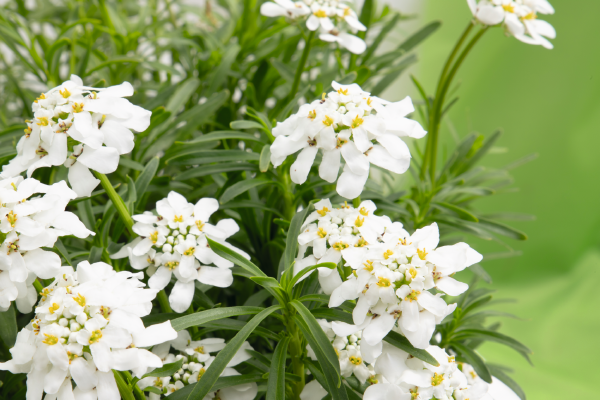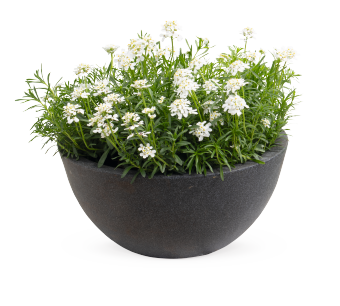

Snow Flurries
- Perfect for spring production
- Compact habit, ideal ground cover
- Loves sunny locations
- Best flower performance in early spring
- Crop Time
- Spring: 20 - 24 weeks
- Height ∅
- 12 ″ / 30 cm
- Exposure
- Sun
- Seed Form
- BeGreen Coating
- Heat Zone
- 9-1
- Hardiness Zone
- 3a-9a
- Best Uses
- Landscape, Rockery
Culture guide
Usage
Cushion perennials for rock garden, a good ground cover
Sow time
May-July for flowering in pots the following year
Sowing method
5-7 seeds per plug, direct sowing into final pots is possible
Germination
14-21 days at 60-65 °F (15-18 °C)
Growing on
Grow on at 50-60 °F (10-15 °C).
Media
Use a well-drained, growing perennial substrate with 0-15 % clay, 0-20 % parts (e.g. wood fibres, bark, sand) 1-1,5 kg/m³ complete balanced fertilizer, 0-2 kg/m³ slow release fertilizer (3-9 months), iron-chelate, micronutrients, pH: 5.5-7.5.
Temperature
Grow at 10-15 °C or outdoors. In winter indoors frost free at 3-5 °C or outdoors. Outdoor fleece needed. For wintering the root development in pots should be very good. In December (earliest from CW 51) the plants start to grow for 6-7 weeks at 15-18 °C. Cold temperatures at 8-12 °C will increase the cultivation time.
Fertilization
Low-moderate fertilization levels are required. Fertilize the crop weekly with 80-100 ppm nitrogen (at 2 kg/m³ slow release fertilizer in substrate), using a complete balanced fertilizer. Avoid high ammonium and high nitrogen levels. High nitrogen levels are the cause that shoots are stretched and the plants fall apart. Don’t fertilize after mid September. In spring fertilize with 80-100 ppm nitrogen, using a potassium balanced fertilizer (N: K₂O-ratio: 1:1,5). Prevent magnesium deficiency by applying magnesium sulphate (0,025 %) 1-2 times and in case of Iron deficiency apply iron-chelate for 1-2 times.
Stage I Starts with the radicle breaking through the testa. The roots are touching the medium. Ends with fully developed cotyledons.
Stage II Starts from fully developed cotyledons. Ends with the fully developed true leaf or true leaf pair.
Stage III Starts from the fully developed true leaf or true leaf pair and ends with 80% of the young plants being marketable.
Stage IV All young plants are ready for sale and in the process of being hardened off. This stage lasts about 7 days.
The cultural recommendations are based on results from trials conducted under Central European conditions. Different conditions in other parts of the world may lead to deviations in results achieved.

